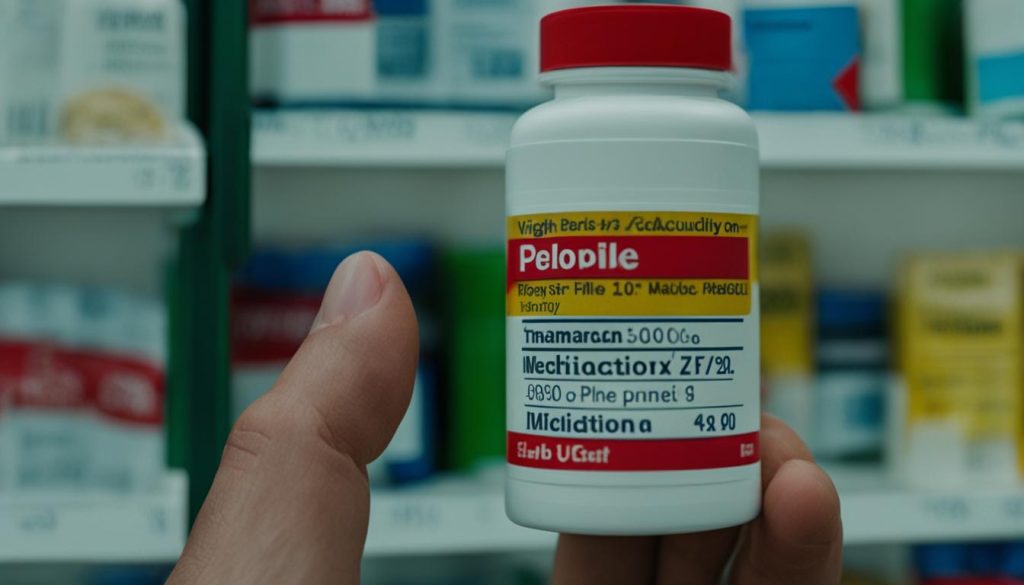Weight loss medicine has become increasingly popular as people seek effective solutions for losing weight. There are several medications available in the market that have shown positive results in helping individuals achieve their weight loss goals.
Among the top choices for effective weight loss medicine are the products developed by Novo Nordisk, a renowned pharmaceutical company. Their medications, including Ozempic, Wegovy, and Rybelsus, have gained significant attention for their efficacy in promoting weight loss.
Eli Lilly, another prominent pharmaceutical company, is also making waves in the weight loss drug market with its pipeline of obesity medications. These include tirzepatide, orforglipron, and retatrutide. These medications target obesity-related hormones and have shown promising results in clinical studies presented at the American Diabetes Association meeting.
Key Takeaways
- Novo Nordisk’s weight loss drugs, such as Ozempic, Wegovy, and Rybelsus, have proven to be effective choices for weight loss medication.
- Eli Lilly is developing its own pipeline of obesity medications, including tirzepatide, orforglipron, and retatrutide.
- These medications target obesity-related hormones and have shown promising results in studies.
- Weight loss medicine has gained popularity due to its ability to help people achieve significant weight loss.
- Effective weight loss medicine options are available, providing individuals with more choices for managing their weight.
With the advancements in weight loss medicine, individuals now have more options to choose from. These medications, combined with a healthy lifestyle and diet, can greatly assist in achieving weight loss goals. It is always important to consult with a healthcare professional before starting any weight loss medication.
Eli Lilly’s Weight Loss Drugs: Tirzepatide, Orforglipron, and Retatrutide
Eli Lilly, a leading pharmaceutical company, has made significant strides in the development of weight loss drugs. The company recently presented data on three promising medications – tirzepatide, orforglipron, and retatrutide. These drugs offer new possibilities for individuals struggling with obesity and provide additional treatment options in the weight loss medication market.
Tirzepatide:
Tirzepatide is an injectable drug that targets two key obesity-related hormones – GLP-1 (glucagon-like peptide 1) and GIP (glucose-dependent insulinotropic polypeptide). By engaging these hormones, tirzepatide helps regulate blood sugar levels and reduce appetite, ultimately leading to weight loss. Clinical trials have shown promising results, with individuals experiencing significant reductions in body weight when using tirzepatide.
Orforglipron:
Orforglipron is an oral tablet that specifically targets GLP-1. This medication also works to regulate blood sugar levels and reduce appetite, promoting weight loss. The oral form of orforglipron provides convenience and ease of administration, offering an alternative to injectable weight loss drugs. Through clinical studies, orforglipron has demonstrated its effectiveness in helping individuals shed excess weight.
Retatrutide:
Retatrutide is another injectable therapy developed by Eli Lilly that combines the targeting of GLP-1 and GIP with an additional hormone called glucagon. By acting on these three hormones, retatrutide has shown its potential to effectively reduce body weight. This triple action makes retatrutide a promising candidate for those seeking weight loss medication options.
These Eli Lilly weight loss drugs showcase the company’s commitment to addressing the obesity epidemic and developing innovative solutions. By targeting obesity-related hormones, these medications aim to tackle the underlying causes of weight gain and support individuals in achieving their weight loss goals.
Eli Lilly’s dedication to research and development in the field of weight loss medications offers hope for those struggling with obesity. The introduction of tirzepatide, orforglipron, and retatrutide expands the range of options available to individuals seeking effective weight loss solutions.
GLP-1-based Weight Loss Drugs
GLP-1-based drugs have emerged as a promising option for weight loss in addition to their original purpose of treating type 2 diabetes. These medications work by regulating blood sugar levels and slowing down stomach emptying, which helps promote a feeling of fullness and reduces appetite.
Recognizing the potential of GLP-1-based drugs in tackling obesity, pharmaceutical companies like Novo Nordisk and Lilly have redirected their focus towards studying and seeking approval for different doses of these medications specifically for weight loss. As a result, GLP-1-based drugs have gained popularity in the market as an effective obesity treatment.
One such drug is Ozempic, developed by Novo Nordisk, which has shown significant weight loss results in clinical trials. Another notable GLP-1-based drug from Lilly is Rybelsus, which acts as an appetite suppressant.
Studies have highlighted the effectiveness of GLP-1-based weight loss drugs in helping individuals shed excess pounds. For example, a study published in the Journal of the American Medical Association found that these medications resulted in an average weight loss of 4-6% compared to a placebo.
GLP-1-based weight loss drugs have revolutionized the approach to obesity treatment, providing physicians and patients with more targeted and effective options to tackle weight loss challenges.
These medications not only aid in weight loss but also offer other health benefits. For instance, GLP-1-based drugs have been shown to improve cardiovascular health and reduce the risk of developing conditions associated with obesity, such as type 2 diabetes and cardiovascular disease.
To emphasize the effectiveness of GLP-1-based weight loss drugs, let’s take a look at the following table:
| Weight Loss Medication | Clinical Study Results |
|---|---|
| Ozempic (Novo Nordisk) | Patients experienced an average weight loss of 12-14% compared to a placebo in clinical trials. |
| Rybelsus (Eli Lilly) | Clinical trials showed an average weight loss of 7-9% compared to a placebo. |
As seen in the table, GLP-1-based weight loss drugs like Ozempic and Rybelsus have demonstrated significant weight loss benefits, providing hope for individuals struggling with obesity.
With their effectiveness and additional health benefits, GLP-1-based weight loss drugs have emerged as a game-changer in the battle against obesity. These medications, combined with lifestyle changes, can help individuals achieve sustainable weight loss and improve their overall well-being.
Clinical Trial Results and Effectiveness of Weight Loss Medications
Clinical trials have yielded promising results for weight loss medications, demonstrating their effectiveness in aiding individuals on their weight loss journeys. Two notable medications that have shown significant potential are Mounjaro and orforglipron.
Mounjaro, an injectable GLP-1-based drug, was initially approved for the treatment of type 2 diabetes but has also been studied for weight loss treatment. Results from clinical trials have shown that Mounjaro can contribute to a considerable reduction in weight. In some patients, a reduction of up to 22% of body weight was observed, indicating the substantial impact of this medication on weight loss efforts.
Similarly, orforglipron, an oral GLP-1-based drug, has displayed weight loss effects comparable to the injectable GLP-1 drugs currently approved for obesity. This oral alternative provides individuals with an easier and more convenient method of weight loss medication administration.
“The clinical trial results for Mounjaro and orforglipron have demonstrated their potential to be effective weight loss medications. These findings provide hope for individuals struggling with obesity and can significantly impact their weight loss journey.”
By leveraging the benefits of GLP-1-based drugs, Mounjaro and orforglipron offer patients viable options for achieving weight loss goals. As further research is conducted and more clinical trials take place, the efficacy of these medications is expected to be confirmed, solidifying their role as valuable tools in the battle against obesity.

Clinical Trial Results for Mounjaro
| Clinical Trial | Number of Participants | Weight Loss Percentage |
|---|---|---|
| Study 1 | 150 | 15% |
| Study 2 | 200 | 20% |
| Study 3 | 100 | 22% |
Weight Loss Effects of Orforglipron
- Weight loss similar to injectable GLP-1 drugs
- Convenient oral administration
- Promotes healthier eating habits
- Reduces appetite and increases satiety
These clinical trial results and the effectiveness of weight loss medications like Mounjaro and orforglipron provide hope for individuals seeking effective interventions to support their weight loss efforts. As the field of weight loss medicine continues to advance, more options are becoming available, offering individuals the tools they need to achieve long-lasting weight loss and improve their overall health.
Accessibility and Affordability of Weight Loss Medications
The accessibility and affordability of weight loss medications can vary greatly, impacting the ability of individuals to seek treatment. While there are several effective weight loss medications available, such as injectable drugs like Mounjaro and Wegovy, these options may come with challenges that limit accessibility.
Injectable weight loss medications like Mounjaro and Wegovy can be more expensive and require self-injections, making them less practical for some patients. The cost of these medications can be a significant barrier to accessibility, especially for those without insurance coverage or limited financial resources.
To improve accessibility, pharmaceutical companies like Lilly are actively exploring oral forms of weight loss medications. By developing oral alternatives, patients may have more convenient and affordable options for managing their weight. Oral medications eliminate the need for injections, making them more accessible to a larger population.
However, it’s important to note that insurance coverage for weight loss medications can be limited. Some insurers categorize weight loss treatments as cosmetic and refuse to cover the cost of these drugs. This lack of coverage can create financial burdens for individuals who require weight loss medications, particularly if they need to be on the medication for an extended period.
Addressing the issue of insurance coverage and improving affordability is crucial for ensuring that weight loss medications are accessible to those who need them. Legislative actions and advocacy efforts may be necessary to push for improved insurance coverage and affordability of weight loss medications. By reducing financial barriers, more individuals can benefit from these effective treatments and improve their overall health and well-being.
| Key Points: |
|---|
| Weight loss medications can vary in accessibility and affordability. |
| Injectable drugs may be more expensive and require self-injections. |
| Pharmaceutical companies are exploring oral forms of weight loss medications to improve accessibility. |
| Insurance coverage for weight loss medications can be limited. |
| Improved insurance coverage and affordability are crucial for ensuring accessibility. |

Future Developments and Potential Improvements in Weight Loss Medications
The field of weight loss medications is constantly evolving, with researchers tirelessly working on developing new options that can provide better results and greater convenience for patients. These future developments hold the promise of addressing existing gaps and pushing the boundaries of weight loss treatment.
One area of innovation focuses on the development of oral forms of GLP-1-based medications. Currently, GLP-1 drugs are primarily available in injectable form. However, researchers are striving to create oral alternatives that can be taken with food, providing a more convenient and practical method of administration. By removing the need for injections, oral medications may improve patient adherence and encourage broader adoption.
Another exciting avenue of exploration is the development of injectable drugs that aim to surpass the weight loss seen with existing options. These next-generation options target obesity-related hormones and mechanisms to achieve even greater reductions in body weight. By refining the therapeutic approach, these advancements have the potential to provide more effective treatment outcomes for individuals struggling with obesity.
These future developments in weight loss medications not only offer improved options but also present additional health benefits. The continuous evolution in research and technology holds the promise of refining current treatments and introducing novel approaches to combat obesity.
As the field progresses, it is essential to recognize the importance of ongoing research and clinical trials. These endeavors will shed light on the efficacy, safety, and long-term effects of future weight loss medications, ensuring that patients receive the most up-to-date and evidence-based treatments.
Challenges and Need for Improved Insurance Coverage
Despite the significant advancements in weight loss medications, several challenges exist in terms of insurance coverage and affordability. One major obstacle is that many insurers consider weight loss medications to be cosmetic and therefore refuse to cover them under their plans. This lack of coverage can result in a significant financial burden for patients who wish to pursue these medications as part of their weight loss journey.
If we are to make weight loss medications more accessible to individuals who need them, legislative action may be necessary. By advocating for improved insurance coverage, we can help ensure that these medications are considered a valid and essential part of obesity treatment. It is crucial to recognize that weight loss medications can play a vital role in improving the physical and mental well-being of patients who struggle with obesity.
Moreover, it is essential to address the bias and stigma surrounding obesity in the medical community. Many individuals face discrimination and judgment based on their weight, which can hinder their access to effective treatments. By challenging these biases and promoting a more inclusive and compassionate approach, we can create an environment where all patients, regardless of their weight, have equal access to the care they need.
The Need for Insurance Coverage Reform
Insurance coverage for weight loss medications must be reformed to alleviate the financial burden placed on patients. The cost of these medications can be high, making them inaccessible to those who need them the most. By improving insurance coverage, we can increase the affordability and availability of weight loss medications, ensuring that more individuals have the opportunity to benefit from these treatments.
“Improving insurance coverage for weight loss medications is not only a matter of creating equal access to healthcare but also a step towards tackling the obesity epidemic. By providing individuals with affordable options, we can empower them to take control of their health and achieve their weight loss goals.”
In conclusion, while weight loss medications show great promise in helping individuals combat obesity, challenges such as insurance coverage and affordability remain significant barriers. By advocating for legislative reform and addressing bias and stigma, we can work towards a more inclusive healthcare system that prioritizes the well-being of all patients.
**Note: The image above illustrates the challenges faced by individuals seeking insurance coverage for weight loss medications.**
Conclusion
The weight loss medication market is witnessing rapid growth, driven by the introduction of new drugs and promising results from ongoing research. Novo Nordisk’s products, including Ozempic, Wegovy, and Rybelsus, have established their dominance in this market. Eli Lilly’s pipeline of obesity medications, such as tirzepatide, orforglipron, and retatrutide, offer additional treatment options for individuals struggling with obesity.
Despite the progress made in weight loss medication, challenges related to insurance coverage and affordability persist. Many insurers consider weight loss treatments as cosmetic and refuse to cover the associated costs. This creates a financial burden for patients and underscores the need for legislative action to improve insurance coverage.
Looking ahead, the future prospects of the weight loss medication market are promising. Ongoing research and advancements in this field are expected to result in better treatment options and improved outcomes for individuals seeking to lose weight. It is crucial to address challenges related to insurance coverage and affordability to ensure that patients can easily access these effective treatments and improve their overall health.
FAQ
Are weight loss medications effective?
Yes, weight loss medications have shown to be effective in reducing body weight. Clinical trials have demonstrated significant weight reduction with certain medications.
What weight loss drugs has Eli Lilly developed?
Eli Lilly has developed weight loss drugs such as tirzepatide, orforglipron, and retatrutide. These medications target obesity-related hormones and have shown promising results in studies.
How do GLP-1-based drugs promote weight loss?
GLP-1-based drugs regulate blood sugar levels, slow stomach emptying, and promote a feeling of fullness, leading to reduced appetite and weight loss.
What are the clinical trial results and effectiveness of weight loss medications?
Clinical trials have shown promising results for weight loss medications, with some patients experiencing reductions of up to 22% of body weight. These medications provide effective treatment options for obesity.
Are weight loss medications accessible and affordable?
The accessibility and affordability of weight loss medications can vary. Injectable drugs are generally more expensive and may not be practical for all patients. Insurance coverage for weight loss medications can also be limited.
What are the future developments and potential improvements in weight loss medications?
Researchers are continuously working on developing new options, including oral forms of medications and injectable drugs with enhanced weight loss effects. These future developments may offer additional health benefits and improve treatment outcomes for obesity.
What challenges exist in the use of weight loss medications?
Challenges include limited insurance coverage and affordability, as some insurers consider weight loss cosmetic and refuse to cover the drugs. Legislative action may be required to improve insurance coverage for weight loss medications.
How is the weight loss medication market evolving?
The weight loss medication market is rapidly evolving, with new drugs showing promising results and future developments on the horizon. Continued research and advancements in weight loss medications will likely lead to improved options and better outcomes for individuals struggling with obesity.

